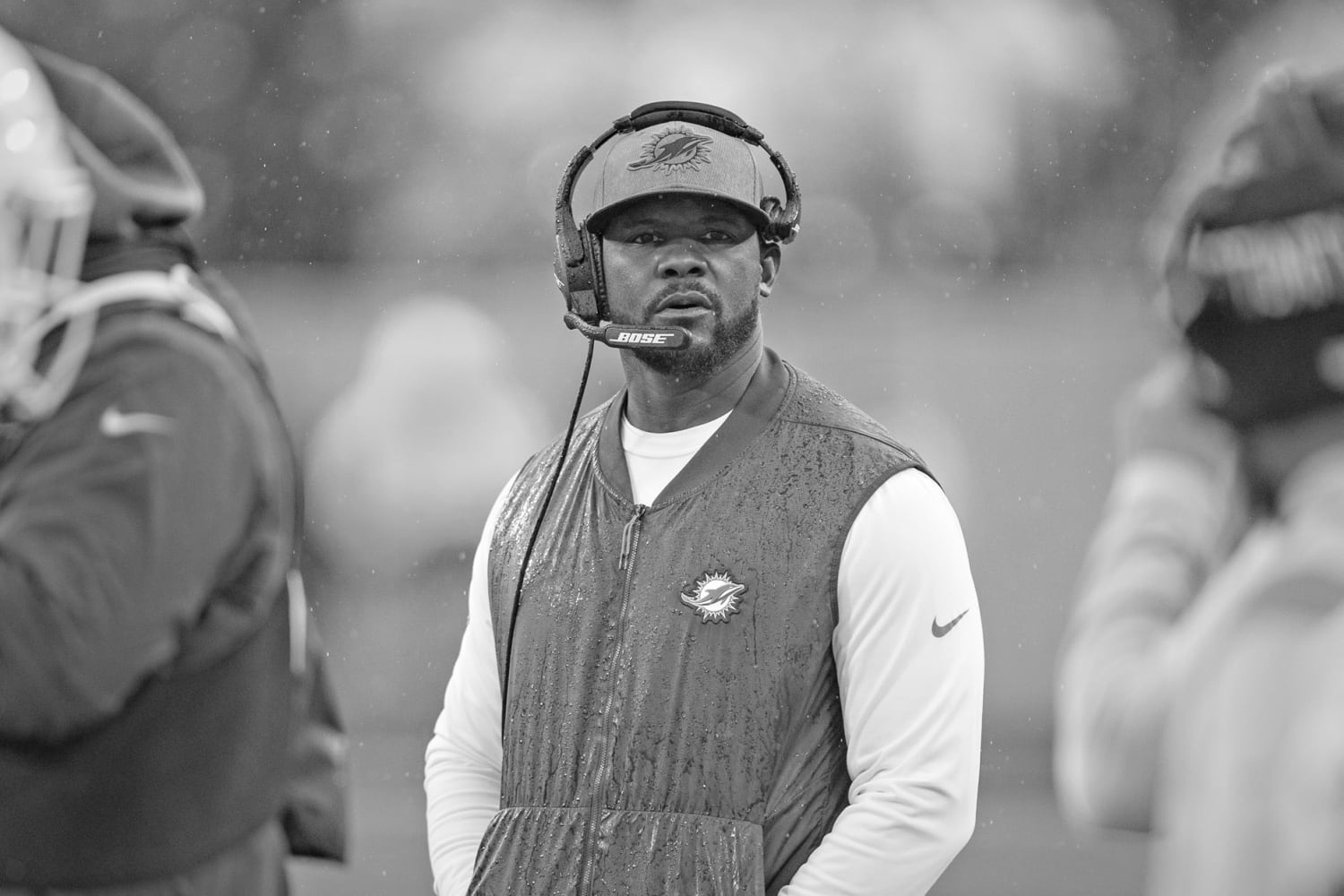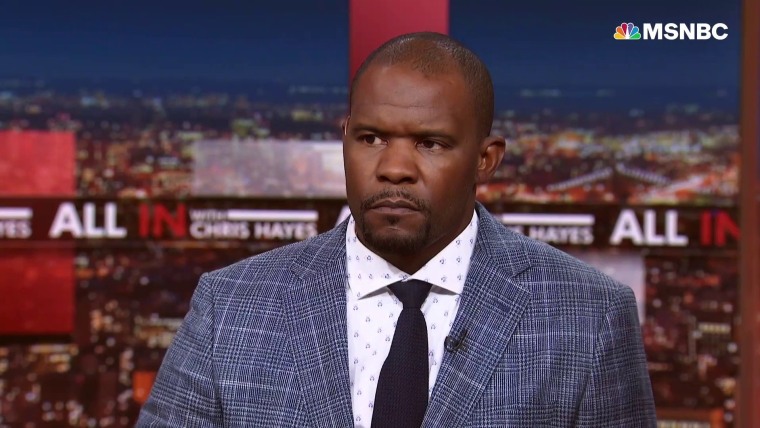Recently fired Miami Dolphins head coach Brian Flores has put the National Football League on the defensive more than a week before the league’s marquee event, the Super Bowl.
And that’s a good thing. Because his racial-discrimination lawsuit is finally shining a very detailed light on NFL hiring and promotion practices that have been downright offensive for decades. In particular, his lawsuit focuses on the way NFL teams exploit so-called diversity hiring initiatives by interviewing token candidates of color.
His racial-discrimination lawsuit is finally shining a very detailed light on NFL hiring and promotion practices that have been downright offensive for decades.
Flores, born in Brooklyn to parents from Honduras, was fired in January despite his second-straight winning season in Miami, working with a modestly talented roster. He may not be able to prove the most explosive allegations in his class-action suit. But he is likely to win in the court of public opinion — even if it also means he never coaches another NFL game.
“In certain critical ways, the NFL is racially segregated and managed much like a plantation,” notes the lawsuit, which is loaded with receipts. Dolphins team owner Stephen Ross, whom Flores’ lawsuit alleges he rebuffed when offered $100,000 to lose games to improve Miami’s draft position, comes off looking particularly bad. (“The implication that we acted in a manner inconsistent with the integrity of the game is incorrect,” said the Dolphins in a statement.)
Sound familiar? Colin Kaepernick, the former San Francisco 49ers’ quarterback, made an almost identical statement in a Netflix series in November 2021, nearly five years after the NFL essentially blackballed him for his national anthem protests against racial injustice and police brutality. (NFL Commissioner Roger Goodell said in 2020 that he wished he had “listened earlier” to the quarterback’s message.)
The NFL and the three teams named in the suit — the Dolphins, the New York Giants and the Denver Broncos — have all issued statements denying Flores’ allegations. “Diversity is core to everything we do,” the NFL wrote. But Flores’ accusations suggest the NFL’s real core rotted through a while ago, thanks to a pattern of discrimination that goes back decades.
In his complaint, Flores alleges that in texts exchanged with his former boss, Bill Belichick, the New England Patriots’ legendary coach, he learned the Giants had already decided to make Buffalo Bills’ assistant Brian Daboll, who is white, their new head coach three days before Flores’ interview with Giants leadership.
If true, Flores was merely a token candidate, interviewed for optics but never really considered for the job. (“The allegations from Brian Flores directed toward the Denver Broncos in today’s court filing are blatantly false,” responded the Broncos team in a statement. The Giants also denied any wrongdoing, saying “Brian Flores was in the conversation to be our head coach until the eleventh hour. Ultimately, we hired the individual we felt was most qualified to be our next head coach.” The NFL added: “We will defend against these claims, which are without merit.” Belichick has not responded to requests for comment.)
Flores alleges that he felt a similar dynamic during a 2019 interview with the Broncos, for which team president John Elway and his staff showed up an hour late, looking disheveled. (The Broncos hired Vic Fangio, who is white and was fired last month after three seasons.)
Sham interviews with Black candidates have been a potential problem since 2003, when the NFL adopted the “Rooney Rule” (named for then-Pittsburgh Steelers President Dan Rooney). The Rooney Rule requires teams to interview at least two nonwhite candidates for head coaching and other front-office jobs.
But, says Flores, the Rooney Rule has failed. Miserably.
Numbers back Flores up. The NFL had three Black head coaches 20 years ago. Today, when roughly 70 percent of the players are Black, the 32-team league has only one Black head coach — Mike Tomlin, a Super Bowl champion who has never had a losing season in 15 years with the Steelers. (In 2020 there were three Black head coaches, but that number has since dropped following the firing of Flores and David Culley by the Houston Texans.)
So where do NFL head coaches come from? Nearly all have been promoted from a coordinator position. But these coveted deputy jobs also have a diversity problem. Today, there are just four Black offensive coordinators, 11 Black defensive coordinators, three Black special-teams coordinators and three Black quarterback coaches.
Instead of a pipeline for coaches of color, the NFL has a sieve.
Check out the websites of NFL teams and you will often see the sons of white coaches listed as assistants.
Check out the websites of NFL teams and you will often see the sons of white coaches listed as assistants. This is not just about wins and losses. It’s about opportunity.
Nathaniel Hackett, the Broncos’ new head coach, is the son of former University of Southern California head coach and NFL assistant Paul Hackett. 49ers’ head coach Kyle Shanahan is the son of former Broncos’ head coach Mike Shanahan. Scott Turner, the Washington Commanders’ offensive coordinator, is the son of former NFL head coach Norv Turner. Patriots’ assistants Steve and Brian Belichick coach with their father, Bill.
There’s your NFL coaching pipeline. It exists — for the sons of some white coaches.
It seems like the NFL could improve these atrocious numbers if it really wanted. But Commissioner Roger Goodell, who made $63 million per year in 2020 and 2021 as the league’s point man, appears to have no desire to challenge the hiring practices of the people who could fire him.
Notably, there are no Black NFL owners.
Flores wasn’t a perfect coach. But his firing forces us to once again to talk about institutional biases, inconsistent standards and the willingness of NFL team and league leaders to maintain the status quo.
What needs to change is the face of NFL ownership. The Broncos are for sale at a reported asking price of $4 billion. Maybe Goodell should advocate for significant Black ownership in the Mile High City.
Although Flores has interviews scheduled this week with the New Orleans Saints and the Texans, his truth-telling has most likely ended his career in pro football. But the impact of his lawsuit against the NFL should reverberate long after the cheering at Super Bowl LVI has faded.
Source: | This article originally belongs to Nbcnews.com











